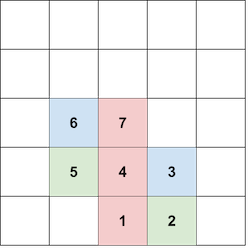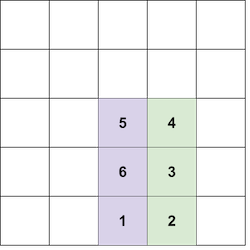CF1706B.Making Towers
普及/提高-
通过率:0%
AC君温馨提醒
该题目为【codeforces】题库的题目,您提交的代码将被提交至codeforces进行远程评测,并由ACGO抓取测评结果后进行展示。由于远程测评的测评机由其他平台提供,我们无法保证该服务的稳定性,若提交后无反应,请等待一段时间后再进行重试。
题目描述
You have a sequence of n colored blocks. The color of the i -th block is ci , an integer between 1 and n .
You will place the blocks down in sequence on an infinite coordinate grid in the following way.
- Initially, you place block 1 at (0,0) .
- For 2≤i≤n , if the (i−1) -th block is placed at position (x,y) , then the i -th block can be placed at one of positions (x+1,y) , (x−1,y) , (x,y+1) (but not at position (x,y−1) ), as long no previous block was placed at that position.
A tower is formed by s blocks such that they are placed at positions (x,y),(x,y+1),…,(x,y+s−1) for some position (x,y) and integer s . The size of the tower is s , the number of blocks in it. A tower of color r is a tower such that all blocks in it have the color r .
For each color r from 1 to n , solve the following problem independently:
- Find the maximum size of a tower of color r that you can form by placing down the blocks according to the rules.
输入格式
The first line contains a single integer t ( 1≤t≤104 ) — the number of test cases.
The first line of each test case contains a single integer n ( 1≤n≤105 ).
The second line of each test case contains n integers c1,c2,…,cn ( 1≤ci≤n ).
It is guaranteed that the sum of n over all test cases does not exceed 2⋅105 .
输出格式
For each test case, output n integers. The r -th of them should be the maximum size of an tower of color r you can form by following the given rules. If you cannot form any tower of color r , the r -th integer should be 0 .
输入输出样例
输入#1
6 7 1 2 3 1 2 3 1 6 4 2 2 2 4 4 1 1 5 5 4 5 3 5 6 3 3 3 1 3 3 8 1 2 3 4 4 3 2 1
输出#1
3 2 2 0 0 0 0 0 3 0 2 0 0 1 0 0 1 1 1 1 0 4 0 0 0 2 2 2 2 0 0 0 0
说明/提示
In the first test case, one of the possible ways to form a tower of color 1 and size 3 is:
- place block 1 at position (0,0) ;
- place block 2 to the right of block 1 , at position (1,0) ;
- place block 3 above block 2 , at position (1,1) ;
- place block 4 to the left of block 3 , at position (0,1) ;
- place block 5 to the left of block 4 , at position (−1,1) ;
- place block 6 above block 5 , at position (−1,2) ;
- place block 7 to the right of block 6 , at position (0,2) .
 The blocks at positions (0,0) , (0,1) , and (0,2) all have color 1 , forming an tower of size 3 .
The blocks at positions (0,0) , (0,1) , and (0,2) all have color 1 , forming an tower of size 3 .
In the second test case, note that the following placement is not valid, since you are not allowed to place block 6 under block 5 :
 It can be shown that it is impossible to form a tower of color 4 and size 3 .
It can be shown that it is impossible to form a tower of color 4 and size 3 .